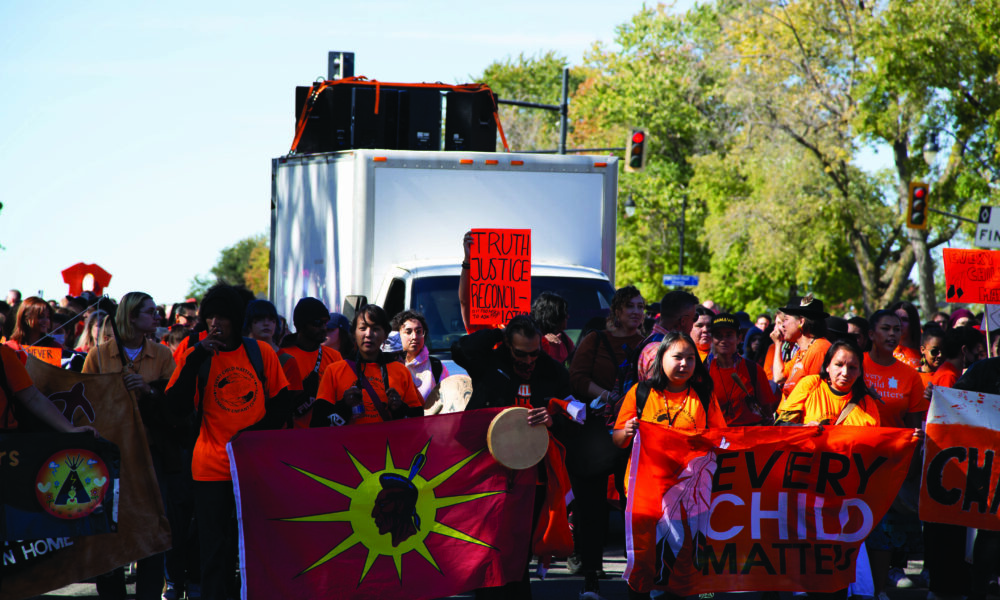On Sept. 30, hundreds of people gathered in front of the George-Étienne Cartier monument at the foot of Mount Royal before marching through Montreal to commemorate the National Day for Truth and Reconciliation—also known as Orange Shirt Day. Since 2021, Sept. 30 has marked a federal statutory holiday, although the province of Quebec does not officially recognize it. The event, organized by the Native Women’s Shelter of Montreal and Resilience Montreal, featured speeches and performances from many Indigenous community members, such as Kahnawá:ke Grand Chief Kahsennenhawe Sky-Deer, Inuk musician Elisapie Isaac, the Generational Warriors group, and the Travelling Spirit Drum group.
Many of those who attended the walk wore orange t-shirts to honour the Indigenous children who were taken from their homes and forced to assimilate under Canada’s residential school system—many of whom were abused and never returned home. Marchers traversed Milton-Parc, where a disproportionate number of unhoused Indigenous people reside, and paused for speeches in front of McGill’s Roddick Gates before concluding the event at Place du Canada. Chants like “no pride in genocide” and the call-and-response “when I say land, you say back” echoed through downtown Montreal.
Steve McComber, a Mohawk elder from the Kahnawá:ke Nation and a speaker at the event, emphasized that the path towards Truth and Reconciliation requires a commitment to learning about the injustices that Indigenous communities have suffered.
“Becoming aware of what is the truth, is the beginning to reconcil[ing],” McComber said in an interview with The McGill Tribune. “Our people lived under oppressive policies for generations, but people are not aware of that. So once people become aware, [then it will be] the beginning for things to change.”
Nakuset, the executive director of the Native Women’s Shelter of Montreal and one of the march’s organizers, believes that attending Truth and Reconciliation Day events is a significant first step that non-Indigenous people can take to become educated and more active in the fight against anti-Indigeneity.
“I want [settlers] to be here so they can listen to the messages that everyone will be giving,” Nakuset said in an interview with the Tribune. “Everyone has a different message […] for people to absorb it and to do better as opposed to deflecting, ignoring, and walking away, which is what we usually get.”
On the same day, McGill’s fourth “We Will Walk Together/Skàtne Entewathahìta” took place at the Education Building from 10 a.m. to 12 p.m. The event featured speeches and performances from Associate Provost (Indigenous Initiatives) Celeste Pedri-Spade, Alex Allard-Gray, and other Indigenous community members. Local Indigenous vendors and artisans and the Indigenous Law Association, which held an Orange Shirt sale, attended to fundraise for organizations such as Resilience Montreal.
Olivia Bornyi, U2 Arts and a member of McGill’s Indigenous Initiatives Unit, led the programming and the communications committee for the event. Bornyi believes that Truth and Reconciliation Day is “integral to students’ education” and hopes that McGill’s event starts a conversation about the historic oppression of Indigenous peoples.
“I would have liked to see a little bit more student turnout, but we did get a fair bit,” Bornyi said in an interview with the Tribune. “It’s a very emotional day for many members of the Indigenous community, which is very important to recognize.”
Philippe Haddad, 2L, used his position as a member of the Rugby Leadership Group to get his teammates to attend the event. Haddad called on the McGill community to become more “active participants rather than complicit bystanders” by engaging in conversations about Indigenous rights.
“Many [dissociate] from Truth and Reconciliation by regarding it as a legislative issue,” Haddad said in a statement to the Tribune. “As an educational institution, McGill should be highlighting safe spaces for dialogue and storytelling […] specifically for Indigenous folks, providing alternatives to settler-colonial educational structures, and freeing itself from settler-colonial influence in […] governance as a first step to addressing a prevalent imperialist mindset.”









Pingback: Varsity Report Card: Fall 2022 - The McGill Tribune